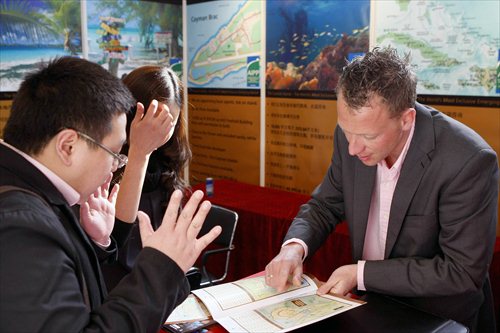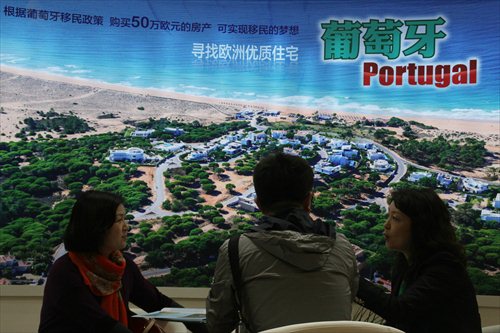HOME >> METRO SHANGHAI
Court case reveals problems with immigration investment programs
By Global Times – The Youth Daily Source:Global Times-Agencies Published: 2016-3-1 18:23:01

A seaside township in Portugal Photo: CFP
The beginning of 2016 has seen the real estate market in China's first and second-tier cities explode. In January alone, property prices in Shanghai soared 21.4 percent. Yangliu Jun, a new real estate development with 388 apartments in Hangzhou, attracted over 3,000 potential clients and was sold out within half a day.
Another property with 352 apartments in Shanghai sold out in one day. These apartments were each worth more than 10 million yuan ($1.53 million). Several real estate trading centers in Shanghai have had to limit the number of clients attending and have asked for extra security guards.
Some Chinese buyers are not just buying property at home - recently they have doubled their investment in overseas properties. A report from Knight Frank, a leading residential and commercial property consultancy, shows that Chinese investors spent more than $30 billion buying real estate overseas last year, double the $15.1 billion spent in 2014.
But not all real estate deals end happily. A Shanghai woman, Miss Zhang, has become embroiled in a complex lawsuit after trying to invest in real estate in Portugal.
Golden visas
Portugal launched its "Golden Visa" investment immigration program in October 2012. Under this program non-EU citizens who spend 500,000 euros ($544,175) buying property in Portugal can apply for residency. They will have the right to live in Portugal and travel within the European Union with this visa.
Miss Zhang and her family run a business in Sichuan Province. At the beginning of 2014, Zhang's father visited the Huanqiu immigration agency at one of the high-end office buildings in Shanghai. Agency staff told him that the investment immigration channels to Canada and Australia were more difficult and the UK now required immigrant investors to reside there for at least six months every year. The father and daughter chose Portugal as their preferred investment country because investors only have to reside there for seven days a year.
However, finding a suitable piece of real estate for 500,000 euros is not easy. "Finding a suitable property that fitted the 500,000 euro limit established by the Portuguese immigration authorities, we went on a house hunting tour arranged by the agency," Zhang said.
In February 2014, Huanqiu staff flew to Sichuan and signed a service contract with Zhang. For the tour, translating and the legal services provided by the agency, Zhang paid 50,000 yuan. The agency staff promised Zhang that the properties recommended by them would be "flawless."
Zhang and her father went to Portugal and almost immediately began looking at apartments along with an interpreter. They first visited an apartment in Coimbra where the vendors were asking for 350,000 euros.
"To reach the 500,000 euro mark, we would have had to buy two apartments like that, which would have cost 700,000 euros," Zhang said. She and her father felt that the deal was not economical.
Later on, they looked at a house priced at 600,000 euros - but they were not prepared to invest that much for a golden visa. Time began to run out for the pair and they were feeling stressed about the arrangement. But on the last day there they were shown an attractive beach villa. It was not luxurious but it had a pool.
After some bargaining, Zhang agreed to pay 530,000 euros. "It was like a really good bargain and we felt that we shouldn't miss it," Zhang said.

Chinese investors consult real estate agents about purchasing property overseas. Photo: Yang Hui/GT
Shocking discovery
After handing over 4.5 million yuan for the house and about 50,000 yuan for taxes, Zhang settled down to wait for her "golden visa."
The visa arrived eventually but she discovered something that shocked her. "I found there were several other Chinese people who had bought houses next to mine for investment immigration. One Chinese friend told me that my house was really only worth 350,000 euros. And the prices for Chinese investors were much more than the prices charged for other nationalities. A foreigner could buy that house for just 200,000 euros," Zhang said.
Now angry and wanting answers, Zhang searched online and found several other Chinese people had had similar experiences. It turned out that the Chinese agency, Huanqiu, had a partnership with a Portuguese agency named Nobal. Huanqiu collected a large amount in commissions for every deal between its Chinese clients and Nobal. Even though Huanqiu charged 50,000 yuan for services, it never told Zhang the real value of the villa.
To determine the real value of her villa by the sea, Zhang hired a civil engineer from the University of Lisbon. His report, that the villa was really worth only 350,000 euros, stunned the Shanghai woman.
In July 2015, Zhang received her Portuguese visa. And after she had complained Huanqiu promised to return 10 percent of the house price. But Zhang was irate at the 180,000 euro difference between the real value and the price she paid, and she decided to sue Huanqiu.
The case was heard in Jing'an district court on February 16. Both sides agreed to settle, and Huanqiu will offer a new settlement shortly.
"We know that we need to pay agencies something when we want to do investment immigration. But these Chinese agents are conning their own countrymen. It makes me very sad," Zhang said after the hearing.

Chinese investors consult real estate agents about purchasing property overseas. Photo: IC
Sad and embittered
Zhang and her father are members of a WeChat group set up for Chinese immigration investors who have been conned by real estate agents. Every day, people add their sad and embittered stories to the group which so far numbers about 150.
A consular notice published by the Chinese Embassy in Portugal has also underlined the problems in the market. According to the notice, Portugal has received 2,788 applications for its golden visa program. At the end of 2015, 2,202 of these applications were from Chinese investors.
"Because the information provided by some agencies was not transparent, the economic interests of some investors have been harmed. And lawyers hired by the clients failed to submit their applications in time and this affected the application process. These have caused problems for investors," the embassy wrote.
Ji Yihong, a Chinese lawyer based in Spain, told the Global Times that in Portugal some real estate developers colluded with immigration agencies.
"These agencies take a lot in commissions. They offer packaged services to clients including legal advise, travel arrangements and house hunting. And then they include these costs in the prices of the properties that they sell," he said. His law firm helped more than 30 Chinese clients apply for investment residency in Spain last year. "In Spain, this situation wouldn't happen. Spanish developers would rather not sell properties than con their clients."
According to Ji, in September 2013 Spain launched a similar investment immigration program that let investors apply for residency by buying properties worth 500,000 euros but the number of applications from Chinese investors was much lower than the number in Portugal. When there were 2,000 applications in Portugal there were fewer than 500 in Spain.
"Chinese immigration agencies want to earn at least 8 to 10 percent in commission on each deal, and Portuguese developers let them do this by including the cost in the real estate prices. Spanish developers don't let them make so much, so Chinese agencies see little profit in the Spanish market. Chinese agencies keep recommending Portugal and Cyprus to Chinese investors, because there is more profit for them there. Some people have been conned in Spain but it doesn't happen as often as it has in Portugal," Ji said.
According to the Knight Frank report, New York, London, Sydney and Melbourne are the current preferred destinations for Chinese immigration investors. In Europe, apart from Portugal and Spain, Greece and Cyprus also have the programs where investors can be given residency in return for them purchasing real estate. Investors can obtain Greek residency by purchasing property worth 250,000 euros. For 300,000 euros worth of real estate, investors can apply for residency in Cyprus.
Separate legal work
Ji Yihong suggested that Chinese investors shouldn't trust agencies without doing some research into their background. "Besides, investors should separate the legal work from the purchasing of the real estate. Agencies often offer to sell real estate and not charge for the legal work. Clients think that this will be a saving, but, in fact they have already lost hundreds of thousands because of the price of the property," he said.
Hou Xueling is a founder of Eurasia Silk Road, a Spanish consultancy specialized in real estate investment and immigration in Spain. Since last August she has met more than 80 Chinese people interested in investment immigration. "I've heard about several cases where Chinese were conned in Portugal but I haven't heard of this happening in Spain," Hou told the Global Times.
Hou suggests that Chinese clients should not rush to buy real estate. "First, clients should avoid agencies that sell real estate at high prices. After choosing a property, they should ask lawyers to undertake a thorough investigation of the deal. And they should pay close attention to the details in the contract, and question any clauses that could cause problems."
Global Times - The Youth Daily
Newspaper headline: The Portuguese housing sting
Posted in: Metro Shanghai, City Panorama